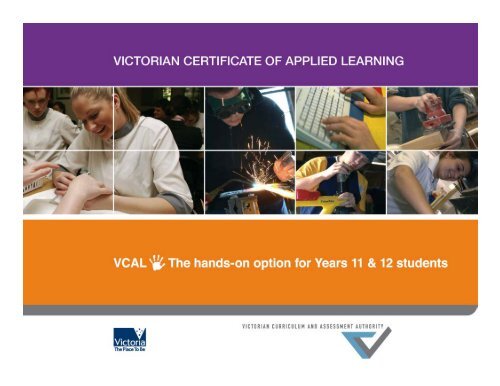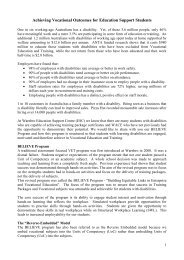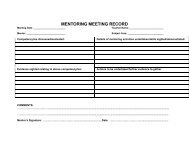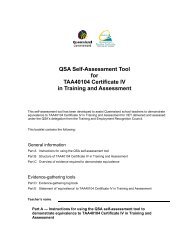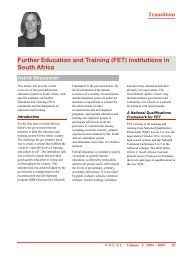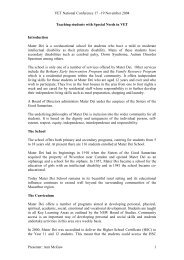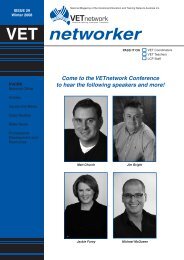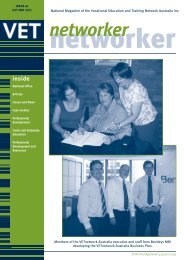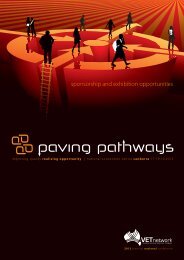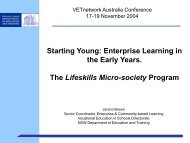David Gallagher - Why has VCAL been so successful?
David Gallagher - Why has VCAL been so successful?
David Gallagher - Why has VCAL been so successful?
You also want an ePaper? Increase the reach of your titles
YUMPU automatically turns print PDFs into web optimized ePapers that Google loves.
Victorian Certificateof Applied LearningFour PassionsVETnetwork Conference<strong>David</strong> <strong>Gallagher</strong><strong>VCAL</strong> Project ManagerVictorian Curriculum and Assessment Authority
<strong>Why</strong> <strong>VCAL</strong>?• Research highlights wider range of curriculum choicesfor young people is necessary• Opens up new and expanded pathways to work orfurther study• Works towards achieving the Government’s goals andtargets• Improves Year 12 participation rates
<strong>VCAL</strong> qualification3 <strong>VCAL</strong> award levels:• Foundation (30% of the cohort)• Intermediate (50% of the cohort)• Senior (20% of the cohort)
<strong>VCAL</strong> enrolmentsTotal number of <strong>VCAL</strong> enrolments15000100005000512781251069212000+05462002 2003 2004 2005 2006
<strong>VCAL</strong> ProvidersTotal number of <strong>VCAL</strong> providers5004003002001000380 387322239222002 2003 2004 2005 2006
<strong>Why</strong> <strong>has</strong> <strong>VCAL</strong> <strong>been</strong> <strong>successful</strong>?Curriculum Strands• Literacy & Numeracy Skills (LNS)Literacy curriculum encourages the development of knowledge/skills, in thecontexts of family, employment, further learning and communityNumeracy curriculum develops skills to use mathematical skills within <strong>so</strong>cietyrelated to design, measuring, time, travel etc• Industry Specific Skills (ISS)The development of knowledge/skills related to one or more vocational area inpreparation to work or further training
<strong>VCAL</strong> Curriculum Strands• Work Related Skills (WRS)School based projects focusing on enterprise, teamwork,communication, resume writing, job applications,researching industry areas, OH&S etc. The unit mayinclude structured work placements.• Per<strong>so</strong>nal Development Skills (PDS)Development of knowledge/skills that leads to <strong>so</strong>cialresponsible, building community, civic responsibility andimproving self confidence
<strong>VCAL</strong> Course ComponentsA <strong>VCAL</strong> learning program may contain curriculumcomponents drawn from:• <strong>VCAL</strong> units (LNS, ISS, WRS and PDS) or• VCE units (including VET in the VCE programs) or• Other VET curriculum or Training Packages or• Further Education accredited curriculum
Themed <strong>VCAL</strong> programsSkill Shortages• For students seeking a range of experiencewithin a particular industry sector to informchoices for future pathways and to developemployability skills• All curriculum strands linked to the industry area
Themed <strong>VCAL</strong>Examples of Themed <strong>VCAL</strong> programs 2005• Hospitality• Automotive• Service and Retail• Engineering• Building and Construction- plumbing,bricklaying• Media and Communications• Sport and Recreation• Spa and Beauty• Agriculture
Australian School Based Apprenticeships• ASBA meets 2 of the 4 <strong>VCAL</strong> curriculumstrand requirements• Industry Specific Skills (ISS) and WorkRelated Skills (WRS)• Training component satisfies ISS• On the job training component may satisfyWRS learning outcomes
Principles of Applied Learning• Applied learning- curriculum focuses on practical“hands-on” opportunities for learning• Student centred learning – curriculum built onstudent’s interests and abilities - (Year 9/10 119days absent in <strong>VCAL</strong> 7 days)• Engages with the community – partnershipsdeveloped outside the school• Pathway qualification – leads to further education,training or work• Recognises both formal and informal learning• Meeting a need in senior secondary students
<strong>VCAL</strong> On Track 2006 Results• The On Track 2006 school leavers survey collectedresponses from <strong>VCAL</strong> students who completed a <strong>VCAL</strong>Intermediate or Senior certificate in 2005.• 1456 <strong>VCAL</strong> students participated in the On Track 2006survey.• 87.9% of these students had started further education,training or employment since completing <strong>VCAL</strong>.
<strong>VCAL</strong> Destinations 2006Unemployed12%University1% VET Entry-level12%Working part-time15%VET Cert IV+9%Working full-time13%Trainee7%Apprentice31%
<strong>VCAL</strong> Destinations 2005 and 20064540353025Percentage20151050University TAFE/VET Apprentice/Trainee Employed Unemployed DeferredDestinations2005 2006
Was <strong>VCAL</strong> an important rea<strong>so</strong>n for staying at school?50454035Percentage302520151050Strongly AgreeAgreeDisagreeStronglyDisagree
<strong>VCAL</strong> Providers500300Total number of <strong>VCAL</strong> providers380 387323222100-100222002 2003 2004 2005 2006
Lonely days lonely nightsWhere would I be without my women


